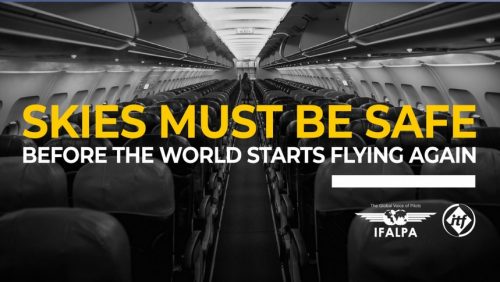IFALPA-ITF key considerations on workplace safety for the resumption of global air services
June 5, 2020
As countries around the world re-open their borders to air services after the Covid-19 lockdown, there remains several health, safety and security concerns that have not yet been fully addressed by aviation regulators or employers. It is the position of the International Federation of Air Line Pilots’ Associations (IFALPA) and the International Transport Workers’ Federation (ITF) that an aircraft is a unique workplace and that additional precautions need to be taken into consideration for the resumption of service.
These measures should be implemented for as long as necessary, and subject to regular review based on operational feedback. When more effective and less disruptive measures become available, they should be given priority.
A phased return to full operations must be led by current scientific data and robust risk assessments that are focused on operational and human factors. For this to be successful, any study, procedure or discussion must have worker representatives at the table to share their unique knowledge and experience from the frontline.
The safety of crew and passengers should be ensured through mitigation measures including, but not limited to, public health recommendations and procedures. We believe that the identification and implementation of best practice in these matters will play a key role to ensure both crew and public confidence in the resumption of operations.
Our view is that the most appropriate body with the authority to independently address this challenge of ensuring a consistent approach to Covid-19 measures across the industry is the International Civil Aviation Organization (ICAO). It is also our view that a minimum standard must be set, and applied equally in all airports globally and onboard all aircraft.
“Transport workers have a unique insight into the challenges being faced and we call on regulators and airlines to listen to the workers keeping the world connected, they are the heart and soul of the aviation industry. The safety of our members and that of passengers is paramount, we call on regulators and employers to ensure all measures are taken to ensure that the skies are safe before resuming services.” – Stephen Cotton ITF General Secretary
We are calling on all aviation stakeholders to address the following concerns:
On the provision and use of personal protective equipment (PPE):
- Provision should be a shared responsibility of both airports and airlines.
- Appropriate PPE (i.e. facemasks, gloves, etc.) should be provided at appropriate times and locations as per ICAO/WHO guidelines.
- In all instances best practices should be followed on when and how to wear, remove, replace and dispose of facemasks and other PPE, and for hand hygiene after removal.
Social distancing:
- Airports and operators should maximize social distancing at all times when in the airport, including ticketing, check-in, security, transportation, food and sanitation facilities, boarding areas and baggage claim, as recommended by ICAO and appropriate local public health authorities.
- Passengers should be educated and instructed on all measures implemented by airlines and airports before travel, during their airport experience and on board the aircraft.
- Deadheading or positioning crew must be afforded some social distancing while travelling as passengers based on the risk assessments and in consideration of their increased exposure to passengers.
Safety risk assessment:
- Any required social distancing must be backed by joint risk assessments with all stakeholders proving that there is minimal risk to crew and passengers.
- As part of any risk assessment, independent expert observers presence is suggested, as well as the assessment of different passenger loads (including full loads) on a representative number of commercial flights to evaluate potential issues and problems related to the implementation of these new measures.
- Crewmember representatives should be included in the assessment process, in line with the ILO Policy Brief: A safe and healthy return to work during the COVID-19 pandemic.
Provision of testing:
- Due to the large number of people crew members and airport workers come into contact within their workplace, they should have access to early, reliable and efficient COVID-19 testing.
Contact tracing:
- Worker representatives should have access to information on the number of workplace cases of COVID-19 and the rates of exposure.
- Crew members should be immediately notified by employers of their exposure to infected passengers and/or colleagues, and where appropriate tested.
“It is vitally important that all aviation workers are confident that every possible measure has been put in place to ensure their workplace is safe. It’s time to provide the same safeguards in the air that we would expect on the ground.” – Captain Jack Netskar, IFALPA President
Tags: COVID-19, IFALPA, International Federation of Air Line Pilots' Associations, personal protective equipment, safety risk assessment, social distancing


I agree that some precautions must be implemented to make the flights safer. But on the other hand, there must be more commercials which inform the passengers how to make a flight safer in individual. This new concept of traveling should become a habit of passengers.